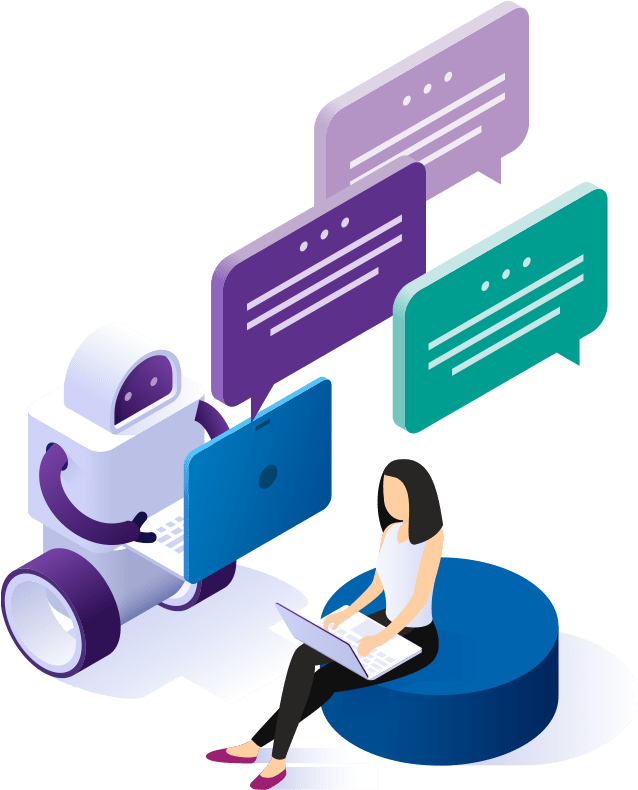Add Contact Center Agents with Virtual Agents
Serve more customers, reduce wait times, and increase customer happiness without adding headcount by using virtual contact center agents.

Delight customers with conversational, personalized self service that solves customer problems efficiently.
Give your customers the experience they deserve quickly, simply, and without having to press any buttons. IVR automation tools can provide:
- Enhanced Customer Service: Say goodbye to impersonal IVR menus. Allow your customers to interact with intelligent virtual agents that provide natural and human-like conversations.
- 24/7 Availability: Never miss a customer call, even after hours. Our virtual agents are always on, providing round-the-clock support, and freeing up your human agents to focus on more complex tasks.
- Efficiency and Cost Savings: Reduce operational costs by automating routine tasks and inquiries. Our virtual agents handle repetitive queries, leaving your live agents to tackle higher-value interactions.
- Data-Driven Insights: Gain valuable insights into customer behavior and preferences with SmartAction’s analytics. Use this data to make informed decisions, personalize customer interactions, and optimize your processes.
- Seamless Transition: Transitioning from traditional IVR to our virtual agents is a breeze. Our technology integrates effortlessly with your existing systems, ensuring a smooth and painless migration.

How to Add Contact Center Agents on a Budget
As the business landscape evolves, the demand for customer service solutions that not only meet the needs of consumers but also help companies maintain a competitive edge increases. One such solution is artificial intelligence (AI) in the form of virtual agents. If properly leveraged, these AI solutions can help businesses provide seamless assistance to their customers without breaking the bank.
In this article, we’re going to explore how to add contact center agents on a budget, specifically focusing on virtual agents in AI, conversational virtual administrative assistants, and strategies to reduce agent attrition.
Virtual Agents
As businesses of all kinds strive to keep up with advancing technology and rising consumer expectations, many find themselves in need of innovative ways to manage costs while still delivering exceptional customer support. Virtual agents in AI have thus far proven to be a cost-effective option for businesses looking to improve their support systems without significantly increasing expenditures. These AI-powered assistants can easily handle routine tasks such as answering frequently asked questions and guiding users through troubleshooting processes, allowing human agents to focus on more complex issues that require critical thinking and personalized attention.
In addition, virtual agents can scale according to business needs without necessitating major infrastructure changes or workforce expansion. By incorporating AI-driven virtual agents into customer support operations, companies can equip themselves with advanced tools built to address today’s consumer demands without compromising budgetary constraints.
Virtual Administrative Assistants
Conversational virtual administrative assistants are another valuable AI-driven tool. A virtual administrative assistant is an advanced incarnation of AI customer service representatives that engages in dynamic interactions using natural language processing capabilities. AI-powered digital administrative assistants not only respond to customer inquiries effectively but also exude a friendly demeanor that mirrors human interaction.
Implementing conversational virtual administrative assistants can allow businesses to streamline appointment scheduling, call routing, and other administrative tasks typically handled by human operators. By automating these functions through a conversational interface, companies can significantly reduce the overhead expenses of hiring and training new employees without sacrificing customer satisfaction.
Addressing Agent Turnover
High staff turnover can severely impact a company’s bottom line, as it’s very expensive to constantly hire and train new employees. To mitigate this issue, businesses should consider investing in ongoing agent development and retention efforts, which may include:
-
Mentorship programs
-
Continuous education opportunities
-
Incentives for performance improvement
-
A supportive workplace culture that values employee input
-
And more
Organizations can also monitor key performance indicators (KPIs) to identify trends related to agent satisfaction and retention. By actively addressing these concerns through targeted initiatives, companies can cultivate a more stable team structure that bolsters overall productivity and minimizes the financial burden of high staff turnover.
Adding agents on a budget is very achievable thanks to AI-driven solutions like virtual agents and conversational virtual administrative assistants. These tools provide businesses with cost-effective tools to meet customer needs in today’s fast-paced digital world without compromising long-term financial sustainability.
Will AI Replace Call Center Agents?
The question of whether or not AI will replace call center agents has sparked countless debates. Many people wonder if the rise of virtual assistant AI and AI call centers will ultimately lead to the demise of traditional customer service jobs. To better understand this issue, we need to explore the various implications of conversational AI technologies and their potential impact on the future of customer service.
What Is Virtual Assistant AI?
Virtual assistant AI is an advanced form of technology that uses natural language processing, machine learning, and other sophisticated algorithms to simulate human-like interactions with users. In the context of call centers, these virtual assistants can manage a high volume of incoming calls by providing instant support to customers, thereby reducing wait times and improving overall efficiency. Moreover, virtual assistants are capable of automatically handling routine tasks like bookings, account inquiries, and troubleshooting.
Impact of AI Call Center Solutions
As businesses increasingly adopt AI call center solutions for their customer service operations, there are genuine concerns about the potential impact on human employment opportunities. Proponents argue that AI offers numerous advantages over traditional call center agents, including improved accuracy when handling queries due to the elimination of human error. Additionally, automated systems can operate 24/7 without experiencing fatigue or burnout — a feat unattainable by even the most dedicated human worker.
However, critics contend that relying solely on AI-driven customer service solutions may result in impersonal interactions that lack the empathy required for complex service situations. They also argue that while automation may improve efficiency in some areas, it could also lead to job losses for thousands of individuals who rely on call center positions for their livelihoods.
Integrating AI Agents Successfully
Ultimately, whether or not AI will fully replace call center agents remains uncertain. It is likely that advancements in conversational AI technology will continue to reshape customer service practices across various industries. The ideal scenario may involve striking a balance between AI-driven automation and human agents, thus leveraging the unique strengths of both parties. Employing AI solutions for routine tasks could free up human workers to focus on more complex and emotionally sensitive issues, enhancing overall customer satisfaction and ensuring that customers receive the best possible support.
While it’s undeniable that virtual assistant AI and conversational AI technologies are making notable strides in improving call center operations, their potential to wholly replace human agents remains a topic of intense debate. Businesses must weigh the benefits of efficiency against potential drawbacks like job displacement and impersonal interactions when deciding whether or not to adopt AI-driven customer service solutions.
Conversational AI Agents
Conversational AI agents employ artificial intelligence and natural language processing techniques to simulate human-like conversations, enabling businesses to provide instant support and personalized recommendations in a seamless manner.
Benefits of Integrating AI Agents
Integrating AI virtual agents into business operations is becoming increasingly popular due to several prominent benefits. For instance, virtual AI agents allow organizations to streamline their customer support processes by automating repetitive tasks like responding to frequently asked questions or guiding users through troubleshooting steps. Additionally, AI agents can enhance customer engagement by delivering personalized experiences based on customers’ individual preferences and browsing behaviors.
Conversational AI In Contact Centers
A contact center virtual agent has the potential to revolutionize how companies handle customer support inquiries. These virtual agents can provide immediate assistance without requiring any human intervention, simultaneously reducing human agents’ workloads and enhancing the customer experience. An intelligent virtual agent is like a highly advanced chatbot that goes beyond simple keyword-based responses and employs sophisticated machine learning algorithms to comprehend complex user queries. It also adapts and evolves over time by learning from its interactions with users, constantly improving its ability to assist customers effectively.
Implementing a contact center virtual agent not only optimizes operational costs but also increases efficiency by reducing response times and handling multiple queries at once. AI-powered assistants can work round-the-clock without suffering from fatigue, ensuring consistent service quality for customers across different time zones. Moreover, conversational AI agents can communicate with customers fluently in any language, helping to foster strong relationships between companies and their diverse clienteles.
Apart from enhancing customer support functions, conversational AI agents can also guide shoppers throughout their purchasing journeys. They can offer personalized product recommendations based on customer preferences, answer questions about various products, and even help with upselling or cross-selling opportunities by identifying related items that customers might find interesting.
By integrating conversational AI technologies into contact centers and other customer-facing operations, companies can not only reduce costs but ultimately elevate the overall user experience. As the world continues to evolve towards automation and digitalization, organizations that embrace conversational AI may find themselves with a competitive edge over those who do not.
AI-Powered Call Center
Artificial intelligence is transforming industries across the globe, and call centers are no exception to this technological revolution. AI-powered call centers are gaining momentum as they prove their ability to significantly improve customer service processes. These advanced solutions leverage cutting-edge technologies like contact center AI, conversational AI bots, and contact center automation to provide unparalleled customer experiences in highly competitive markets.
Contact Center AI
Contact center AI enables businesses to enhance their customer service operations by providing intelligent insights and recommendations based on data analysis. Using machine learning algorithms, natural language processing, and predictive analytics, contact center AI can analyze vast amounts of data from various sources, including call transcripts, emails, chat logs, social media interactions, and more. This comprehensive analysis can make it easier to identify patterns that could assist agents in anticipating customer needs and resolving issues more efficiently.
Conversational AI bots are another essential component of an AI-powered call center. These sophisticated virtual assistants simulate human-like conversations with customers through text or voice-based interfaces. They can understand complex queries and provide accurate responses based on extensive knowledge bases.
Benefits of Conversational AI Bots
Conversational AI bots can not only resolve simple issues but also autonomously handle high-frequency tasks like appointment scheduling or payment processing. This frees up agents’ time to focus on more critical issues that require personal attention and empathy. Additionally, virtual assistants can operate 24/7 without experiencing any decrease in performance quality, enabling shorter response times for customers seeking help outside regular business hours and ensuring consistent support levels throughout the day.
Contact Center Automation
Contact center automation can enhance the overall effectiveness of an AI powered call center by streamlining repetitive tasks that consume valuable agent time. Integrating automated workflows allows agents to concentrate on providing personalized support experiences while reaping the benefits of increased efficiency and reduced costs. Moreover, automation makes it possible for businesses to scale their operations without needing to hire additional staff.
AI powered call centers have revolutionized the customer support landscape with advanced solutions like contact center AI, conversational AI bots, and contact center automation. These intelligent tools offer businesses a competitive edge and ensure that customers can receive exceptional support experiences at all times. As artificial intelligence continues to advance at a rapid pace, we can expect to see even more innovative AI applications in call centers.
How Can SmartAction Help?
SmartAction is a conversational AI tool for contact centers that helps contact centers improve efficiency by automating routine tasks in the contact center with AI. The tool helps contact centers add virtual agents without needing to increase the number of live agents, allowing contact centers to serve more customers with the same number of live human agents.
Click below to find out how we can help transform your contact center with efficiency and automation.

